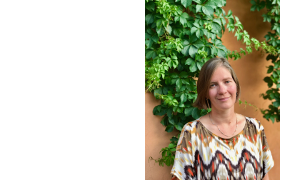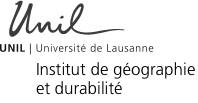
University of Lausanne
Institute of geography and sustainability
Mouline - Géopolis 3612
CH-1015 Lausanne
Teaching
Project cycle: politics, conception, implementation and monitoring (Master , 2018+)
Ce cours offrira un aperçu du cycle de projet et des principaux outils nécessaires à l'élaboration d'un projet de développement. Divisé en 7 séquences (après-midis), le cours sera très axé sur la pratique et abordera notamment les thèmes suivants : identification de contextes et d'acteurs, outils de conception de projets (notamment cadre logique), élaboration d'un budget, suivi et évaluation. Les étudiant.e.s développeront, en groupes, un projet utilisant le canevas simplifié d'un bailleur de fonds, sur la base d'informations récoltées durant le camp de terrain.
Nature Conservation (Master, 2020+)
In November 2019, the University of Lausanne and the IUCN signed a partnership agreement aimed at intensifying their exchanges around research work and its applications on the planet's environmental concerns. This course is a concrete application of this partnership involving both various researchers from Unil and IUCN professionals.
A convention is also being set up between the University of Lausanne and the Lavaux World Heritage Association to strengthen the scientific knowledge carried out in this protected area. This course aims to get better acquainted with this site and the conservation challenges it faces.
The objective of this course is to bring elements of reflection and analysis to students concerning contemporary debates around the conservation and protection of nature. This course reviews the definitions as well as the historical and cultural aspects of nature conservation and the implementation of different protected areas around the world. It also addresses through various examples and case studies the current management issues in nature conservation. This course-seminar includes two field trips with meetings of IUCN professionals.
Environmental and social safeguards project assessments (Master, 2018-2021; 2024+)
This course focuses on techniques and tools to evaluate large, medium and small conservation and development projects, from oil palm plantations and mining company projects to biodiversity conservation projects. Over 8, half days, the course will expose students to the issues and risks around project implementation from both environmental and social concerns, discuss environmental impact assessments (including strategic environmental impact assessments), High Conservation Value and High Carbon Stock approaches, the mitigation hierarchy, environmental and social safeguards, Free Prior Informed Consent, environmental defenders, and engagement with local communities.
Group projects will be conducted whereby students learn how to apply the Environmental and Social Management System (focusing on biodiversity, invasive species, cultural heritage, indigenous peoples and resettlement) used by organisations such as the International Union for Conservation of Nature (IUCN) to assess conservation projects. Real-world projects will be assessed, using those developed for donors such as the Global Environmental Facility and the Green Climate Fund.
Current issues and debates will be explored (e.g. oil palm industry, project scandals by major conservation NGOs) and the class will visit IUCN Headquarters (Gland, Switzerland) to hear from specialists in the sector. A second field trip to an UNIL building work site is also planned. In class talks will be given by experts such as those from The Biodiversity Consultancy (UK).
Qualitative methods
Dans une première partie, plusieurs méthodes qualitatives sont présentées, y compris différentes types d'entretien et d'observation, l'analyse des documents, des méthodes participatives et visuelles. Les étudiant-e-s expérimentent avec certaines de ces méthodes à travers des exercices en classe. Dans une deuxième partie, les étudiant-e-s - organisé-e-s en petits groupes - effectuent une recherche qualitative sur un sujet donné et présentent leurs résultats et expériences
Transdisciplinary Nature Conservation (Master, PhD, 2022, 2024)
The "Transdisciplinary Nature Conservation: the IUCN Red List of Threatened Species from evaluation to practice" course is a UNIL Summer School designed for young biologists who would like to understand and use the IUCN Red List methodology to assess the risk of extinction of species as well as other species monitoring approaches and ecological niche modeling methodologies. It is taught in collaboration with the Faculty of Biology and Medicine, Faculty of Geosciences and Environment, and the International Union for Conservation of Nature's Species Survival Commission.
